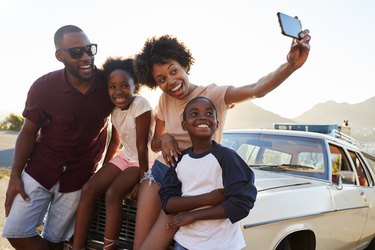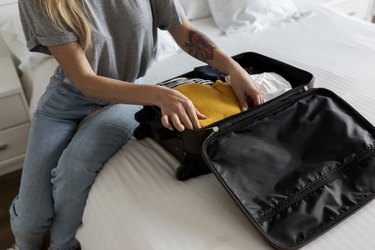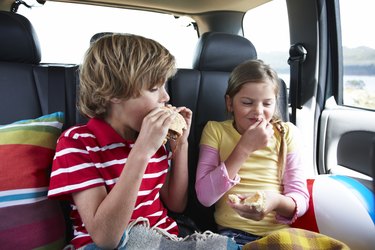
After being cooped up at home for months during the pandemic, you might be longing for the freedom and adventure of the open road.
And while, for many, big trips may be put on hold (thanks to travel restrictions or simply feeling unsafe to fly), more and more people are turning to road trips to scratch their wanderlust itch.
Video of the Day
Video of the Day
According to a June 2020 survey by Airbnb, "nearly half of U.S. respondents said they will prefer to stay within a day's drive for their first trip once lockdown restrictions lift."
Get tips on how to stay healthy, safe and sane during the novel coronavirus pandemic.
Ready to roll down the windows, feel the breeze in your hair and crank the radio? Here's how to stay safe when you hit the road.
Before You Go
1. Assess Your Risk
No matter how careful you are, traveling — which may put you in contact with more people and increase your likelihood of exposure to the coronavirus — escalates your risk of catching (and spreading) COVID-19. And while you might be ready to hop in your car, you should first consider whether it's worth the risk.
According to the Centers for Disease Control and Prevention (CDC), fully vaccinated domestic travelers are less likely to get or spread COVID-19 and can travel safely when necessary with certain precautions. Remember, you're considered fully vaccinated two weeks after your final recommended dose — either the second of two Moderna or Pfizer shots or the single-shot Johnson & Johnson vaccine.
However, if you, your travel companion or someone you live with is unvaccinated and more susceptible to becoming severely sick from COVID-19 (this includes older adults and people with certain underlying medical conditions), you might want to pump the brakes on your road trip.
2. Research Your Travel Routes
If you're looking for a safe escape, the last thing you want is to be hopscotching from one COVID hotspot to another along your travel route. Before your draw up your itinerary, be sure to research the infection rates for each stop you plan to make.
You can find info on each state's COVID case rate over the last week through the Centers for Disease Control and Prevention's COVID Data Tracker. Similarly, the COVID layer in Google Maps provides a seven-day average of newly reported cases by location, and color-coded maps show where infection rates are on the rise.
Just be flexible: Even with more people getting vaccinated, these numbers can change in real time, so you may need to adjust your journey accordingly.
3. Check Travel Restrictions
In general, the CDC says vaccinated domestic travelers don't need to self-quarantine or test negative before or after a trip. However, some destinations may still have state, local and territorial restrictions. Every location has different provisions in place for travelers to protect their community from the spread of COVID-19.
The CDC advises that you check the state, territorial, tribal and local health departments where you are, along your route and where you are going.
If you must quarantine when you get there, pack enough essentials to get you by, including a two-week's supply of food, water and medications.
4. Plan Your Lodgings Carefully

Unless you're traveling by RV, you probably don't plan to sleep in your car. That means you'll need to secure safe lodgings beforehand.
Renting a vacation home or condo has clear advantages versus staying at a hotel, David Freedman, MD, a professor emeritus of infectious diseases at the University of Alabama at Birmingham, tells LIVESTRONG.com. That's because you can socially distance and reduce interactions with others.
Before you book, contact the rental owner to discuss COVID safety precautions such as cleaning procedures and their policy for vacancy between visits (ideally 24 hours).
Airbnb, for example, has enhanced its disinfection protocols, which include a five-step cleaning process based on CDC guidance, and requires a 24-hour vacancy period between bookings.
Still, the only way to ensure your rental space is spotless is to clean it yourself when you arrive. Use disinfectant cleaners to wipe down frequently touched surfaces like countertops, light switches, faucets, toilets, doorknobs, drawer pulls and the refrigerator handle.
But if you're pining for the pampered experience that you can only get at a hotel (we hear you!), avoid elevators and crowded lobbies, and when ordering room service, request that hotel staff leave food outside your door to limit contact with others, Dr. Freedman says.
Alternatively, if you're camping, research campsites and RV parks in advance.
Camping is a good option if you can avoid contact with other people, Dr. Freedman says. But that depends on how campsites are modifying their operations and practices to protect campers against COVID. Inquire ahead of time about the logistics of check-in procedures, using bathroom facilities and getting your utilities and supplies. All these situations may put you in close contact with others.
To that point, avoid shared spaces as much as possible. But if you must use communal areas like showers, maintain social distance, wear your mask and come armed with disinfectant wipes to sanitize high-touch surfaces.
5. Research Car Rental Companies
Using your own vehicle is ideal, but if you need to rent one for your road trip, do your research first. When renting, ask about the company's cleaning processes (companies should use EPA-approved surface disinfectants) and how long it's been since the car was used by anyone, including the person who cleaned it (ideally, at least 24 hours).
"Open all doors and run the ventilation system on full blast for a few minutes before fully getting in the car," Dr. Freedman says.
Airing out the vehicle will help disperse any virus that may be lingering in the air. According to the CDC, COVID-19 may at times travel via airborne particles, which means it can remain suspended in the air for minutes to hours (and potentially infect others even after a sick person leaves a space).
If you want to guarantee your ride is sparkling clean, sanitize frequently touched surfaces (think: the steering wheel, gear shift, door handles, windows, radio/temperature dials and seatbelt buckles) with disinfectant wipes.
On the Road
1. Forego Food Stops When Possible

Stopping for food on the road will increase your interactions with others, and thus ups your odds for encountering someone infected with COVID-19. Dining in a public place is especially risky because you can't wear a mask while eating.
All this is to say, bringing your own food, snacks and drinks is your best bet. And if you must stop at a supermarket, avoid peak shopping times, Dr. Freedman says. (Check Google Maps, which shows you peak busy times for a specific location.)
If you opt not to pack your own grub, using drive-throughs, delivery, takeout and curbside pick-up are all safer options, per the CDC.
2. Be Careful With Bathrooms
Public restrooms are a gamble because they typically have poor ventilation and put you in close contact with others and sullied surfaces, Dr. Freedman says.
Ideally, you should attempt to minimize your bathroom breaks. One way to reduce your urge to go is by drinking less during the drive, Dr. Freedman says.
Of course, this depends on the length of your car ride. If you're on the road for many hours, you should continue to properly hydrate. Plus, delaying your bowel movements for too long can be problematic and ultimately painful.
When you must make a pitstop for the potty, always wear your mask, wash your hands with soap and water for at least 20 seconds once you're finished and use a dry paper towel to avoid touching the faucet and door as you leave.
3. Play It Safe When Getting Gas
One thing you can't avoid on the road is refilling your tank. And neither can the countless other drivers who may stop to refuel. That translates into a lot of potentially germy hands touching the same gas pump.
That's why the CDC recommends using disinfecting wipes on handles and buttons at gas pumps prior to touching them. (The same goes for parking meters and pay stations, by the way.)
Once you're done fueling, slather your hands in hand sanitizer with at least 60 percent alcohol. And when you arrive at your destination, scrub your hands with soap and water.
Tip
Despite your best efforts, you might be exposed to the coronavirus during your road trip. Even if you feel well and don’t have any symptoms, you can still spread the virus. That’s why it’s best to avoid contact with elderly people and others who may be more vulnerable to a severe COVID-19 infection for 14 days after traveling, Dr. Freedman says.
Concerned About COVID-19?
Read more stories to help you navigate the novel coronavirus pandemic:
- Airbnb: “Airbnb Launches Campaign to Support Domestic Travel + Local Economic Growth.”
- Centers for Disease Control and Prevention: “Travel during the COVID-19 Pandemic.”
- Centers for Disease Control and Prevention: “CDC COVID Data Tracker.”
- Google: “Navigate safely with new COVID data in Google Maps.”
- Airbnb: “Getting started with the 5-step enhanced cleaning process.”
- Centers for Disease Control and Prevention: “How COVID-19 Spreads.”
Is this an emergency? If you are experiencing serious medical symptoms, please see the National Library of Medicine’s list of signs you need emergency medical attention or call 911.